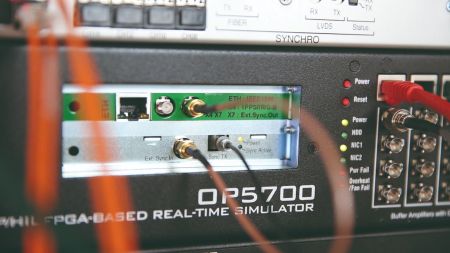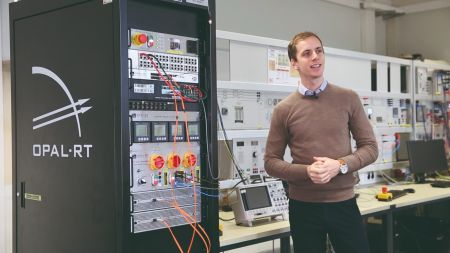An all-in-one solution for studying and researching power engineering
The expansion of cooperation between OPAL-RT and Lucas-Nülle means that colleges and universities now have access to a one-stop solution for power engineering, from basic courses to research level.The institutes benefit from the fact that all users, from students to research staff, work on the same system, thus allowing applications that have already been mastered to be easily incorporated into research work. This dispenses with the time-consuming task of learning new systems. Also, the process of integrating research assistants into research work is made easier if the students are already familiar with the systems from their courses.
The new thing about this solution is that you can perform a Power-Hardware-in-the-Loop (PHIL) simulation quickly and easily thanks to the connection between the Lucas-Nülle Smart Grid training systems and the OPAL-RT Amplifier.
Colleges and universities worldwide use Lucas-Nülle systems to simulate energy supply scenarios.
Based on the comprehensive implementation of Matlab Simulink and SCADA for Power Lab, more and more colleges and universities all over the world are using Lucas-Nülle training systems in their teaching.
The power engineering systems allow students to access a complete energy supply network from generation to consumption in a safe laboratory environment.
This includes renewable energies with fluctuating power generation as well as power distribution with transmission lines, transformers and double busbar units. The fact that the systems as well as the measuring and protection devices can be integrated into SCADA allows central evaluation and control via the software. This means that there are no limits to setting up and investigating smart grids in the laboratory.
The Smart and Microgrid labs come with a Smart Grid control centre, an energy management system, a modern PV system in mains parallel operation, a system for pumped storage and other types of power plants, double-fed asynchronous generators and a system for isolated parallel operation in Microgrid.
In combination with the OPAL-RT LAB, simulations can be validated prior to incorporation into production systems.
By extending the Smart Grid training systems with the OPAL-RT OP1420 amplifier, the laboratory is rendered suitable for use by doctoral students and researchers.This 4Q amplifier with up to 15 kW has a bandwidth of DC to 10 kHz. The system includes an FPGA real-time simulator along with a grid emulator featuring a busbar and measuring instruments.
As well as being able to readily perform PHIL thanks to the combination of simulation, real and industrial hardware, ready-made models also facilitate a quick introduction to simulation. This means that in PhD projects, for example, you can simulate power grids and distributed energy resources (DER). Thanks to the training hardware from Lucas-Nülle, the first validation of results obtained in this way is possible before the first prototype is even available. In the end, this also allows you to make the development of smart energy systems, power electronics and control software for future systems more efficient.

